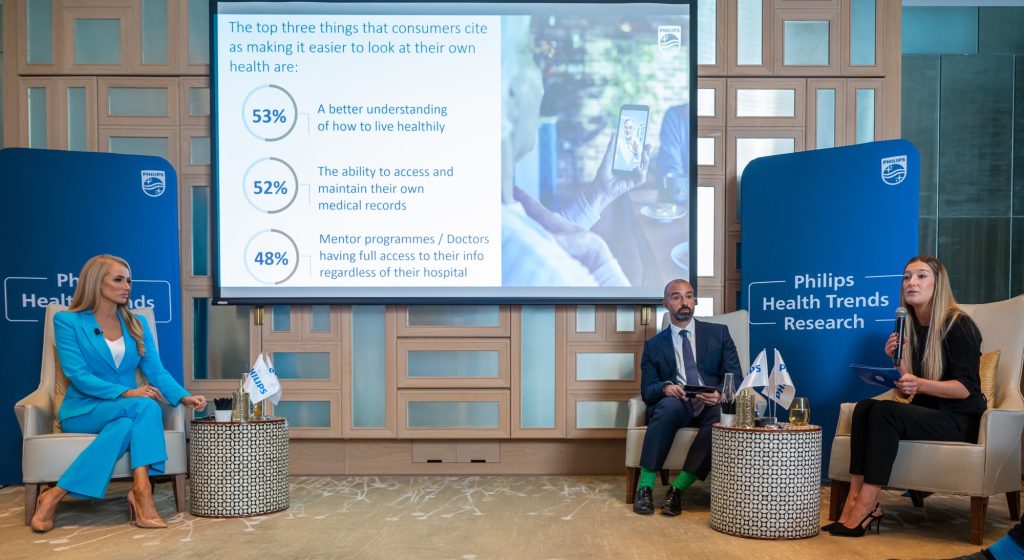Royal Philips, a global leader in health technology, today released its first Health Trends Research United Arab Emirates (UAE) findings, shedding light on the state of local healthcare. Philips commissioned Censuswide, an independent market research consultancy, to conduct the study aimed to equip healthcare providers with insights into current health trends and public perceptions of healthcare in the UAE – enabling them to adapt to these shifts in demand to address immediate priorities and future needs.
“At Philips, we believe that the study validates that the UAE is well-positioned to transition its healthcare approach from sick care, which has historically been the norm, to value-based healthcare. This transformation begins with a greater emphasis on proactive preventive measures, supported by advanced technology that enables improved health outcomes at every stage of care, including diagnosis, treatment, and follow-up care,” says Marc Antoine Zora, General Manager and District Leader, Gulf & Levant, Philips Middle East.
“While residents perceive themselves to generally be in good health, they want to be more proactive, and are ready to embrace digital health technology to realize a healthier future, for themselves and our planet,” says Lucy Stewart, Head of Client Services, Censuswide.
The shifts in consumer perceptions and behavior towards well-being and technology, revealed in the Philips Health Trends Research UAE, are expected to have a long-term impact on the way people think about and engage with healthcare in the future.
Three key themes are particularly prominent in the findings:

Healthy living and prevention
The pandemic has led to greater health consciousness among UAE residents, with 95% taking a proactive approach to protecting their health and 70% feeling more in control of their health since its onset.
89% of respondents rated their current health status as good, with an impressive 88% committing to being more proactive about their health and well-being. Additionally, UAE residents are also aware of how different factors can impact their health, acknowledging that oral health can affect their general health (87%) and heart health (75%).
This drive for improved health is supported by the top four factors that make it easier for people to focus on their health: a better understanding of healthy living (53%), access to and maintenance of personal medical records (52%), mentor programs that provide guided health support to keep them on track (48%) and doctors having access to their information regardless of a hospital (48%).
Power of health technology
The pandemic has accelerated the adoption of digital technologies in the healthcare sector, increasing people’s trust in health technology. The Philips Health Trends Research UAE reveals that 95% of respondents believe technology can help manage their health more efficiently due to its ease of use (51%), faster access to specialists and healthcare professionals (51%), easier access to results (50%), and by allowing all their healthcare data to be stored in one place (46%).
With most UAE residents believing in the benefits of digital health solutions, 67% of respondents confirmed that they are aware of telehealth. The research indicates that 90% would consider using telehealth solutions, and 72% believe virtual discussions with doctors are as effective as face-to-face examinations.
The data confirms that UAE residents are largely agreeable to providing access to their personal data for developmental purposes, with 38% open to allowing all their data to be used, 37% allowing most to be used, and 20% allowing a small portion to be used.
This creates considerable opportunity to truly transform healthcare by tapping into the latest innovations in telehealth that offer several advantages, including easy access to specialized healthcare professionals – regardless of their physical location, with increased opportunities to collaborate, cost savings for both patients and providers, more efficient care with shorter waiting times, and regular and systematic touchpoints: all contributing to better patient outcomes.
Sustainability is a key consideration for healthcare
The Philips Health Trends Research has also revealed that most UAE residents (82%) believe that sustainability should be a priority for healthcare companies. Respondents’ top considerations also highlighted the importance of prioritizing practices that do not harm the environment, with 51% of respondents indicating this as a key priority. Nearly half of the respondents (48%) believe that healthcare companies should conduct their business in a sustainable manner, while 41% feel that these companies should aim to become carbon negative.
These results indicate that residents in the UAE greatly value sustainable business practices; creating the heightened need for healthcare leaders to achieve sustainable healthcare.
“It is encouraging to see such a close alignment between the healthcare fraternity and UAE residents,” says Zora. “Many healthcare leaders are already turning to healthcare technologies to help them replace outdated, less efficient operations and technologies in favour of sustainability. With the patient population embracing sustainable innovations, we believe the sector has an unparalleled opportunity to expand access to quality healthcare, sustainably, while improving outcomes for better healthcare in the UAE and beyond” he adds.

